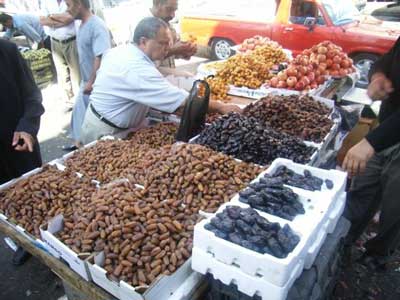As a traveler here during this time, you will notice that there are less restaurants open during the day and that is because Muslims fast during the month of Ramadan from sun up until sun down. When they fast they cannot eat, drink anything, smoke, use swear words, etc...
You will also notice many people traveling home, more traffic, the hour before the sun goes down so that they can get home and break their fast with family. They call this meal 'Iftar." Many people break their fast with dates and milk. When I was at the Cairo Airport during Iftar, people were passing around dates to everyone so they could break their fast. I was even offered a date too!
 |
| Picking out dates for Ramadan |
Some families eat out at a Ramadan tent and there are many tents throughout the city to feed poor people as a form of charity. It is kind of like what we do at in America with soup kitchens and offering a free holiday meal for the homeless. After 'Iftar' the streets become alive at night with people out celebrating or going to someones house to visit.
Here is some history behind the holy month of Ramadan:
Ramadan is in the ninth month of the Islamic calandar and all Muslims across the world celebrate it. It is based on the lunar calandar, so the date changes every year, usually moving ahead 10 days from the year before. So, when I lived in Egypt many years ago, Ramadan took place in the winter and now it's in the summer.
Muslims believe that their holy book, the Qur'an, was first revealed to their Prophet Muhammad during this month. The actual night that the Qur'an was revealed is a night known as Lailut ul-Qadr ('The Night of Power').
 Almost all Muslims try to give up bad habits during Ramadan, and some will try to become better Muslims by praying more or reading the Qur'an more frequently. I witnessed many people having the Qur'an out during the day and reading it. For example, there were two police officers who were sitting together, before the sunset, and one was reading to the other from the holy book.
Almost all Muslims try to give up bad habits during Ramadan, and some will try to become better Muslims by praying more or reading the Qur'an more frequently. I witnessed many people having the Qur'an out during the day and reading it. For example, there were two police officers who were sitting together, before the sunset, and one was reading to the other from the holy book.
Many Muslims will attempt to read the whole of the Qur'an at least once during the Ramadan period. Many will also attend special services in Mosques during which the Qur'an is read.
Fasting is intended to help teach Muslims self-discipline, self-restraint and generosity. It also reminds them of the suffering of the poor, who may rarely get to eat well.
It is common to have one meal (known as the suhoor), just before sunrise and another (known as the iftar), directly after sunset.
Because Ramadan is a time to spend with friends and family, the fast will often be broken by different Muslim families coming together to share in an evening meal.
You will also see many lanterns (fanoos) as decorations during Ramadan. Lanterns and lamps of various kinds, hues and degrees of brightness, have always been special to the Egyptians.
Many stories of their origins have been told. One story has it
that the Fatimid Caliph Al Hakim Bi-Amr Illah wanted to
light the streets of Cairo during Ramadan nights, so he
ordered all the sheikhs of mosques to hang Fanooses that
could be illuminated by candles. As a result, the Fanoos
became a custom that has never been abandoned.

During the few days before Ramadan arrives, children
become excited and are more insistent about having a
Fanoos. In fact, most of them can hardly wait to start
swinging and singing. Thats why, exactly one week before
Ramadan, Egypt streets are transformed into workshops for
tinsmiths to produce as many Fanooses as possible.

The Fanoos makers produce the tens of thousands of
Fanooses needed to meet the demand during Ramadan.
The Fanoos makers usually start between six to nine months
before Ramadan begins.

Eid ul Fitr
The end of Ramadan is marked by a big celebration called 'Eid-ul-Fitr', the Festival of the Breaking of the Fast.
Muslims are not only celebrating the end of fasting, but thanking Allah, God, for the help and strength that he gave them throughout the previous month to help them practice self-control.
The festival begins when the first sight of the new moon is seen in the sky.
There are special services outdoors and in Mosques, processions through the streets, and of course, a special celebratory meal - eaten during daytime, the first daytime meal Muslims will have had in a month.
Eid is also a time of forgiveness, and making amends.
During Eid-ul-Fitr Muslims dress in their finest clothes, give gifts to children and spend time with their friends and family.
At Eid it is obligatory to give a set amount of money to charity to be used to help poor people buy new clothes and food so they too can celebrate.
Egyptian's have a special cookie during the Eid. Many people make it at home, but you can find them in every bakery too. It is called Kahk and they are delicious.
Here is a link that explains them more and the recipe if you want to try and make it yourself http://arabianmama.com/2012/12/30/egyptian-eid-cookies-aka-kahk/
Egyptian's have a special cookie during the Eid. Many people make it at home, but you can find them in every bakery too. It is called Kahk and they are delicious.
Here is a link that explains them more and the recipe if you want to try and make it yourself http://arabianmama.com/2012/12/30/egyptian-eid-cookies-aka-kahk/
No comments:
Post a Comment